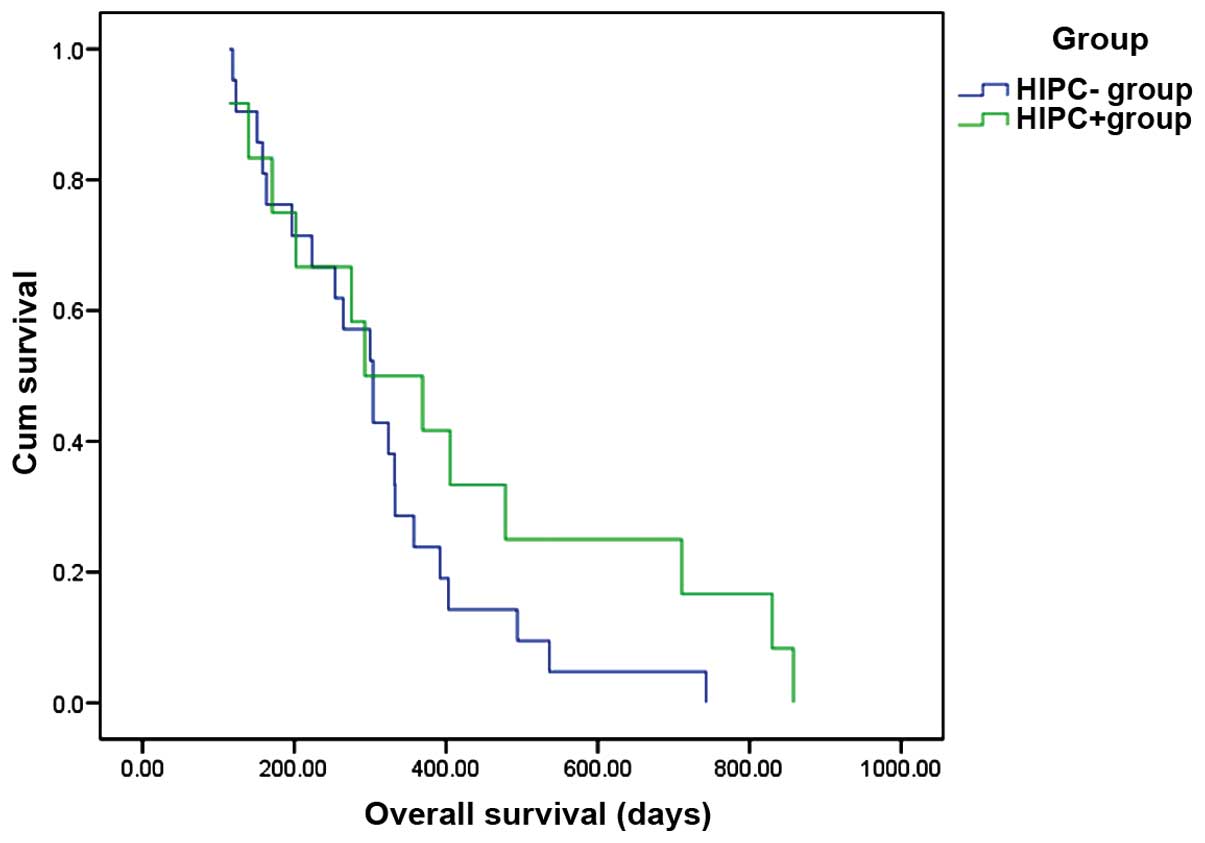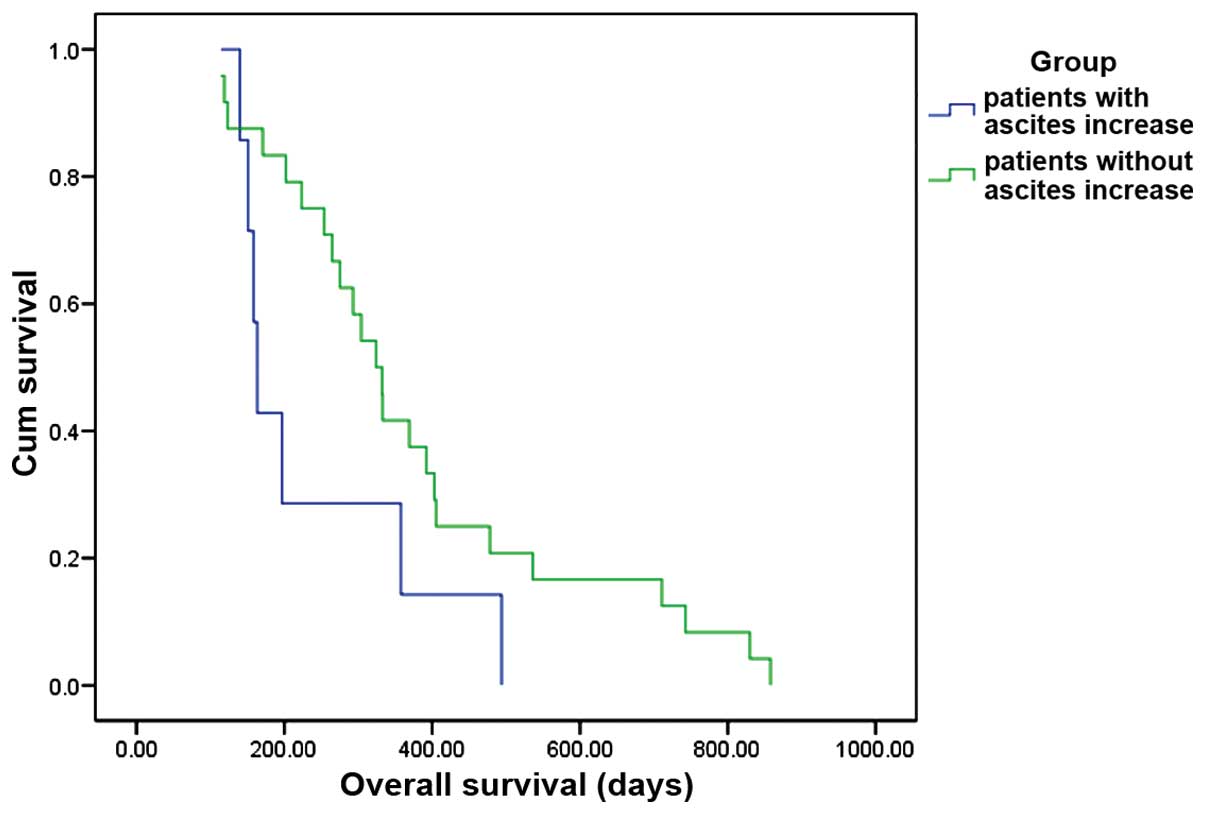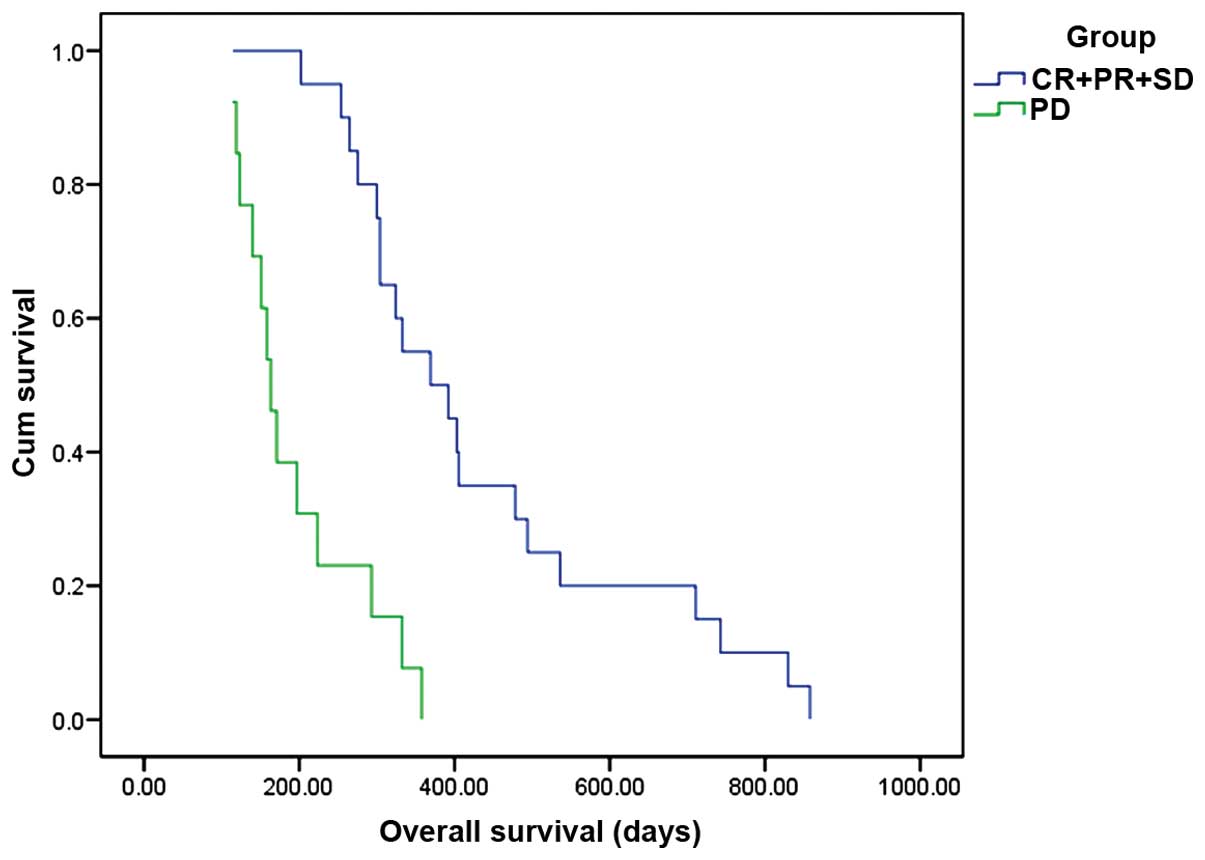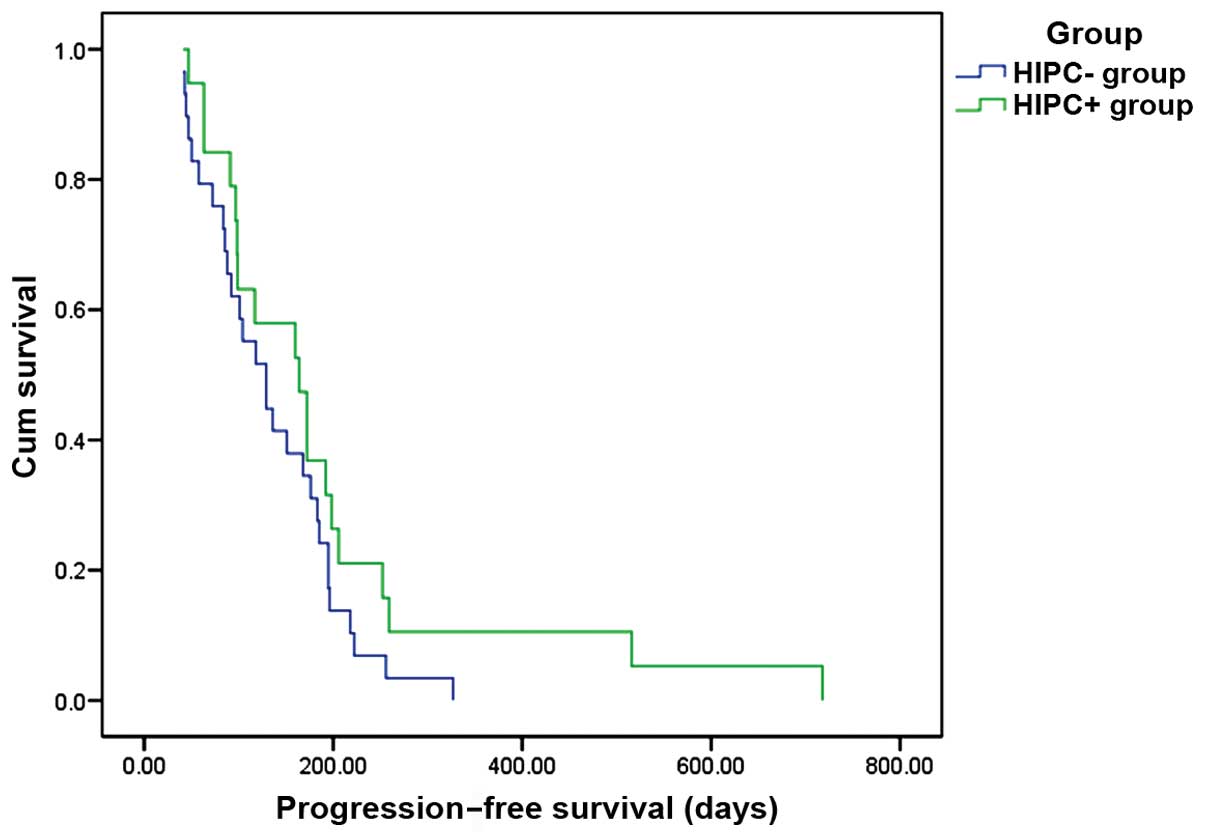|
1
|
Brigand C, Arvieux C, Gilly FN and Glehen
O: Treatment of peritoneal carcinomatosis in gastric cancers. Dig
Dis. 22:366–373. 2004. View Article : Google Scholar : PubMed/NCBI
|
|
2
|
Isobe Y, Nashimoto A, Akazawa K, Oda I,
Hayashi K, Miyashiro I, Katai H, Tsujitani S, Kodera Y, Seto Y and
Kaminishi M: Gastric cancer treatment in Japan: 2008 annual report
of the JGCA Nationwide Registry. Gastric Cancer. 14:301–316. 2011.
View Article : Google Scholar : PubMed/NCBI
|
|
3
|
Yonemura Y, Endou Y, Sasaki T, Hirano M,
Mizumoto A, Matsuda T, Takao N, Ichinose M, Miura M and Li Y:
Surgical treatment for peritoneal carcinomatosis from gastric
cancer. Eur J Surg Oncol. 36:1131–1138. 2010. View Article : Google Scholar : PubMed/NCBI
|
|
4
|
Kodera Y, Ito Y, Ito S, Ohashi N,
Mochizuki Y, Yamamura Y, Koike M, Fujiwara M, Nakanishi H and Nakao
A: Intraperitoneal paclitaxel: A possible impact of regional
delivery for prevention of peritoneal carcinomatosis in patients
with gastric carcinoma. Hepatogastroenterology. 54:960–963.
2007.PubMed/NCBI
|
|
5
|
Ishigami H, Kitayama J, Otani K, Kamei T,
Soma D, Miyato H, Yamashita H, Hidemura A, Kaisaki S and Nagawa H:
Phase I pharmacokinetic study of weekly intravenous and
intraperitoneal paclitaxel combined with S-1 for advanced gastric
cancer. Oncology. 76:311–314. 2009. View Article : Google Scholar : PubMed/NCBI
|
|
6
|
Ishigami H, Kitayama J, Kaisaki S,
Hidemura A, Kato M, Otani K, Kamei T, Soma D, Miyato H, Yamashita H
and Nagawa H: Phase II study of weekly intravenous and
intraperitoneal paclitaxel combined with S-1 for advanced gastric
cancer with peritoneal metastasis. Ann Oncol. 21:67–70. 2010.
View Article : Google Scholar : PubMed/NCBI
|
|
7
|
Ishigami H, Kitayama J, Kaisaki S,
Yamaguchi H, Yamashita H, Emoto S and Nagawa H: Phase I study of
biweekly intravenous paclitaxel plus intraperitoneal cisplatin and
paclitaxel for gastric cancer with peritoneal metastasis. Oncology.
79:269–272. 2010. View Article : Google Scholar : PubMed/NCBI
|
|
8
|
Matharu G, Tucker O and Alderson D:
Systematic review of intraperitoneal chemotherapy for gastric
cancer. Br J Surg. 98:1225–1235. 2011. View
Article : Google Scholar : PubMed/NCBI
|
|
9
|
Yonemura Y, Ninomiya I, Kaji M, Sugiyama
K, Fujimura T, Sawa T, Katayama K, Tanaka S, Hirono Y, Miwa K, et
al: Prophylaxis with intraoperative chemohyperthermia against
peritoneal recurrence of serosal invasion-positive gastric cancer.
World J Surg. 19:450–454; discussion 455. 1995. View Article : Google Scholar : PubMed/NCBI
|
|
10
|
Dedrick RL: Theoretical and experimental
bases of intraperitoneal chemotherapy. Semin Oncol. 12(3 Suppl 4):
S1–S6. 1985.
|
|
11
|
Shimada T, Nomura M, Yokogawa K, Endo Y,
Sasaki T, Miyamoto K and Yonemura Y: Pharmacokinetic advantage of
intraperitoneal injection of docetaxel in the treatment for
peritoneal dissemination of cancer in mice. J Pharm Pharmacol.
57:177–181. 2005. View Article : Google Scholar : PubMed/NCBI
|
|
12
|
Speyer JL, Sugarbaker PH, Collins JM,
Dedrick RL, Klecker RW Jr and Myers CE: Portal levels and hepatic
clearance of 5-fluorouracil after intraperitoneal administration in
humans. Cancer Res. 41:1916–1922. 1981.PubMed/NCBI
|
|
13
|
Landry J, Tepper JE, Wood WC, Moulton EO,
Koerner F and Sullinger J: Patterns of failure following curative
resection of gastric carcinoma. Int J Radiat Oncol Biol Phys.
19:1357–1362. 1990. View Article : Google Scholar : PubMed/NCBI
|
|
14
|
Shiu MH and Fortner JG: Intraperitoneal
hyperthermic treatment of implanted peritoneal cancer in rats.
Cancer Res. 40:4081–4084. 1980.PubMed/NCBI
|
|
15
|
Zhao C, Dai C and Chen X: Whole-body
hyperthermia combined with hyperthermic intraperitoneal
chemotherapy for the treatment of stage IV advanced gastric cancer.
Int J Hyperthermia. 28:735–741. 2012. View Article : Google Scholar : PubMed/NCBI
|
|
16
|
Sun J, Song Y, Wang Z, Gao P, Chen X, Xu
Y, Liang J and Xu H: Benefits of hyperthermic intraperitoneal
chemotherapy for patients with serosal invasion in gastric cancer:
A meta-analysis of the randomized controlled trials. BMC Cancer.
12:5262012. View Article : Google Scholar : PubMed/NCBI
|
|
17
|
Esquivel J, Elias D, Baratti D, Kusamura S
and Deraco M: Consensus statement on the loco regional treatment of
colorectal cancer with peritoneal dissemination. J Surg Oncol.
98:263–267. 2008. View Article : Google Scholar : PubMed/NCBI
|
|
18
|
Portilla Gómez A: Peritoneal
carcinomatosis. Ten years of applying the new combined triple
therapy. Personal experience. Cir Esp. 82:346–351. 2007.(In
Spanish). View Article : Google Scholar : PubMed/NCBI
|
|
19
|
Shimizu T and Saijo N: Common toxicity
criteria: version 2.0, an improved reference for grading the
adverse reaction of cancer treatment. Nihon Rinsho. 61:937–942.
2003.PubMed/NCBI
|
|
20
|
Eisenhauer EA, Therasse P, Bogaerts J,
Schwartz LH, Sargent D, Ford R, Dancey J, Arbuck S, Gwyther S,
Mooney M, et al: New response evaluation criteria in solid tumours:
Revised RECIST guideline (version 1.1). Eur J Cancer. 45:228–247.
2009. View Article : Google Scholar : PubMed/NCBI
|
|
21
|
Alberts DS, Markman M, Armstrong D,
Rothenberg ML, Muggia F and Howell SB: Intraperitoneal therapy for
stage III ovarian cancer: A therapy whose time has come! J Clin
Oncol. 20:3944–3946. 2002.PubMed/NCBI
|
|
22
|
Jaaback K, Johnson N and Lawrie TA:
Intraperitoneal chemotherapy for the initial management of primary
epithelial ovarian cancer. Cochrane Database Syst Rev CD005340.
2011. View Article : Google Scholar
|
|
23
|
Verwaal VJ, van Ruth S, de Bree E, van
Slooten GW, van Tinteren H, Boot H and Zoetmulder FA: Randomized
trial of cytoreduction and hyperthermic intraperitoneal
chemotherapy versus systemic chemotherapy and palliative surgery in
patients with peritoneal carcinomatosis of colorectal cancer. J
Clin Oncol. 21:3737–3743. 2003. View Article : Google Scholar : PubMed/NCBI
|
|
24
|
Sugarbaker PH: New standard of care for
appendiceal epithelial neoplasms and pseudomyxoma peritonei
syndrome? Lancet Oncol. 7:69–76. 2006. View Article : Google Scholar : PubMed/NCBI
|
|
25
|
Fujimoto S, Takahashi M, Mutou T,
Kobayashi K, Toyosawa T, Isawa E, Sumida M and Ohkubo H: Improved
mortality rate of gastric carcinoma patients with peritoneal
carcinomatosis treated with intraperitoneal hyperthermic
chemoperfusion combined with surgery. Cancer. 79:884–891. 1997.
View Article : Google Scholar : PubMed/NCBI
|
|
26
|
Beaujard AC, Glehen O, Caillot JL,
Francois Y, Bienvenu J, Panteix G, Garbit F, Grandclément E, Vignal
J and Gilly FN: Intraperitoneal chemohyperthermia with mitomycin C
for digestive tract cancer patients with peritoneal carcinomatosis.
Cancer. 88:2512–2519. 2000. View Article : Google Scholar : PubMed/NCBI
|
|
27
|
Mussa A, Sandrucci S and Zanon C:
Intraoperative chemohyperthermia for advanced gastric cancer: A new
procedure with closed abdomen and previously constructed
anastomosis. Tumori. 87(Suppl): S18–S20. 2001.PubMed/NCBI
|
|
28
|
Yonemura Y, Kawamura T, Bandou E,
Takahashi S, Sawa T and Matsuki N: Treatment of peritoneal
dissemination from gastric cancer by peritonectomy and
chemohyperthermic peritoneal perfusion. Br J Surg. 92:370–375.
2005. View
Article : Google Scholar : PubMed/NCBI
|
|
29
|
Glehen O, Gilly FN, Arvieux C, Cotte E,
Boutitie F, Mansvelt B, Bereder JM, Lorimier G, Quenet F and Elias
D: Association Française de Chirurgie: Peritoneal carcinomatosis
from gastric cancer: A multi-institutional study of 159 patients
treated by cytoreductive surgery combined with perioperative
intraperitoneal chemotherapy. Ann Surg Oncol. 17:2370–2377. 2010.
View Article : Google Scholar : PubMed/NCBI
|
|
30
|
Yang XJ, Li Y and Yonemura Y:
Cytoreductive surgery plus hyperthermic intraperitoneal
chemotherapy to treat gastric cancer with ascites and/or peritoneal
carcinomatosis: Results from a Chinese center. J Surg Oncol.
101:457–464. 2010. View Article : Google Scholar : PubMed/NCBI
|
|
31
|
Yang XJ, Huang CQ, Suo T, Mei LJ, Yang GL,
Cheng FL, Zhou YF, Xiong B, Yonemura Y and Li Y: Cytoreductive
surgery and hyperthermic intraperitoneal chemotherapy improves
survival of patients with peritoneal carcinomatosis from gastric
cancer: Final results of a phase III randomized clinical trial. Ann
Surg Oncol. 18:1575–1581. 2011. View Article : Google Scholar : PubMed/NCBI
|
|
32
|
Magge D, Zenati M, Mavanur A, Winer J,
Ramalingam L, Jones H, Zureikat A, Holtzman M, Lee K, Ahrendt S, et
al: Aggressive locoregional surgical therapy for gastric peritoneal
carcinomatosis. Ann Surg Oncol. 21:1448–1455. 2014. View Article : Google Scholar : PubMed/NCBI
|


















